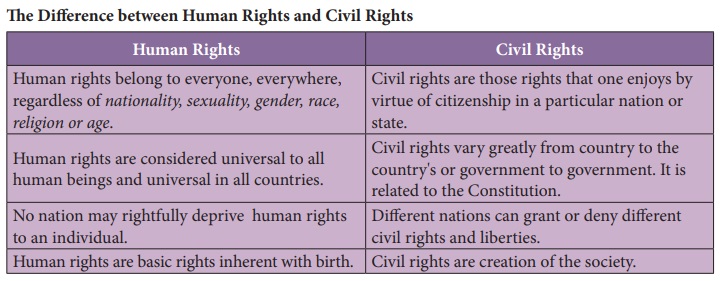Human Rights and UNO | Chapter 4 | Civics | 8th Social Science - Kinds of Human Rights | 8th Social Science : Civics : Chapter 4 : Human Rights and UNO
Chapter: 8th Social Science : Civics : Chapter 4 : Human Rights and UNO
Kinds of Human Rights
Kinds of Human Rights
There are 30 Articles incorporated
in the Universal Declaration of Human Rights.
These rights are broadly classified
into Five primary categories. They are as follows
a. Civil Rights
The term civil rights refers to the
basic rights afforded by laws of the government to every person. This is the
right to be treated as an equal to anyone else. It includes the rights to life,
liberty, freedom from slavery and arbitrary arrest.
b. Political Rights
Political rights are exercised in
the formation and administration of a government. The Civil and Political
rights are directly related to modern democracy. They protect the individual
from the misuse of political power and recognise every individual’s right to
participate in their country’s political process. It includes the freedom of
expression, and peaceful assembly, the right to take part in the government of
one’s country, the right to vote, the freedom of speech and obtain information.
c.
Social Rights
It is necessary for an individual to
fully participate in the society. Social rights are those rights necessary for
an adequate standard of living including the right to education, health care,
food, clothing, shelter and social security.
d. Economic Rights
The right to participate in an
economy that benefits all and to desirable work. Economic rights guarantee
every person to have condition under which they are able to meet their needs.
This includes the rights to employment and fair wage, the reasonable limitation
of working hours, shelter, education and adequate standard of living, and the
right to property.
e. Cultural Rights
The right to freedom of religion and
to speak the language and to practice the cultural life of the community, the
right to share in scientific advancement, and right to the protection of moral
and material interest.
The Difference between Human Rights and Civil Rights

Human Rights
• Human rights belong to everyone,
everywhere, regardless of nationality, sexuality, gender, race, religion or
age.
• Human rights are considered
universal to all human beings and universal in all countries.
• No nation may rightfully deprive
human rights to an individual.
• Human rights are basic rights
inherent with birth.
Civil Rights
• Civil rights are those rights that
one enjoys by virtue of citizenship in a particular nation or state.
• Civil rights vary greatly from
country to the country's or government to government. It is related to the
Constitution.
• Different nations can grant or
deny different civil rights and liberties.
• Civil rights are creation of the
society.
Related Topics